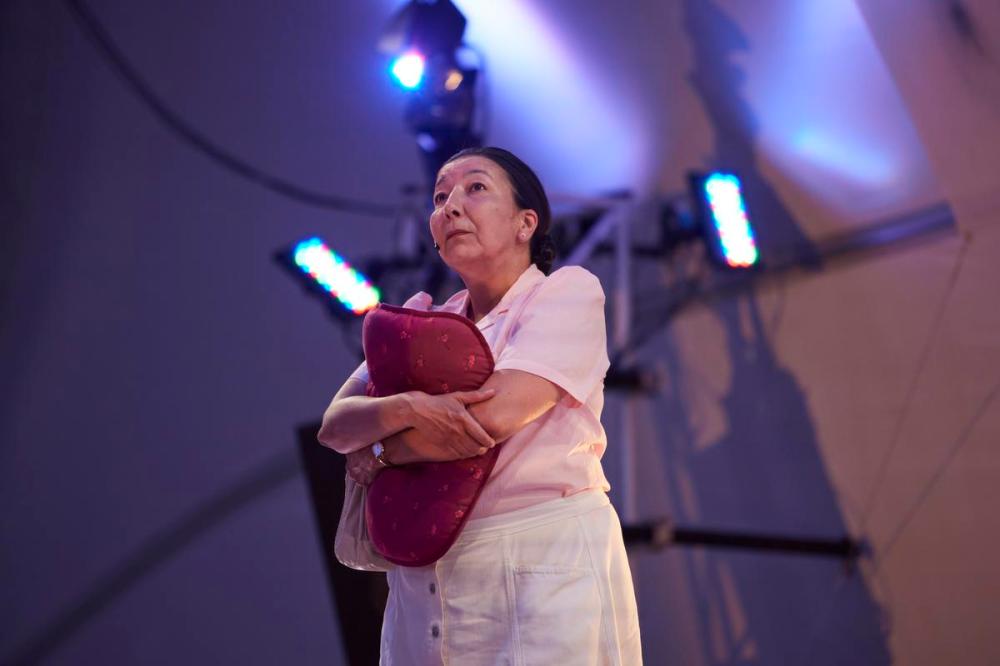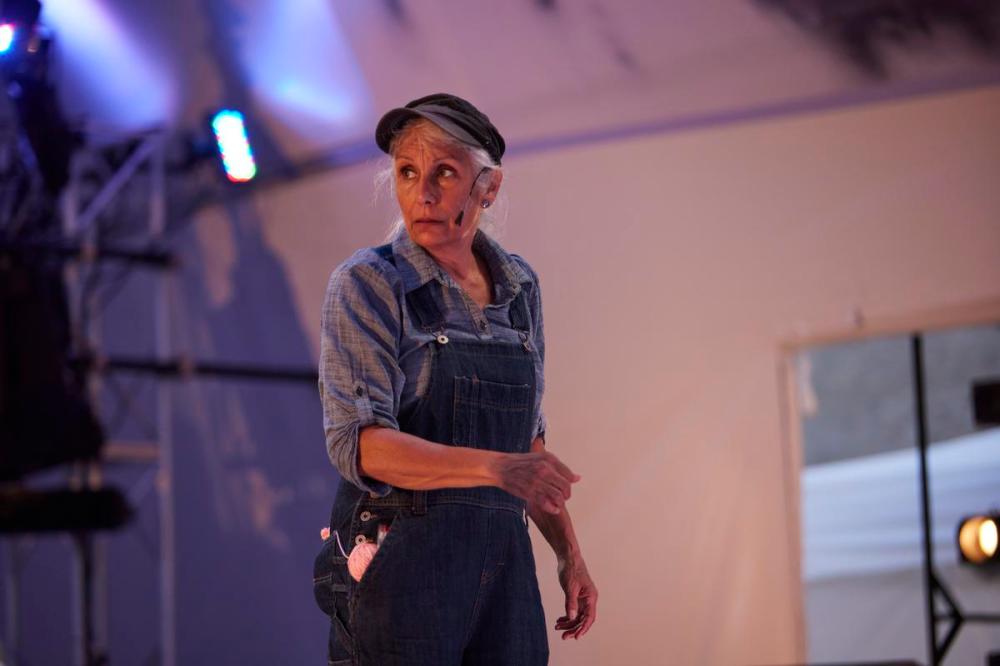With graves confirmed at former residential schools, the cast of Tomson Highway’s ‘The Rez Sisters’ finds deeper meaning in the play
Advertisement
Read this article for free:
or
Already have an account? Log in here »
To continue reading, please subscribe:
Monthly Digital Subscription
$0 for the first 4 weeks*
- Enjoy unlimited reading on winnipegfreepress.com
- Read the E-Edition, our digital replica newspaper
- Access News Break, our award-winning app
- Play interactive puzzles
*No charge for 4 weeks then price increases to the regular rate of $19.00 plus GST every four weeks. Offer available to new and qualified returning subscribers only. Cancel any time.
Monthly Digital Subscription
$4.75/week*
- Enjoy unlimited reading on winnipegfreepress.com
- Read the E-Edition, our digital replica newspaper
- Access News Break, our award-winning app
- Play interactive puzzles
*Billed as $19 plus GST every four weeks. Cancel any time.
To continue reading, please subscribe:
Add Free Press access to your Brandon Sun subscription for only an additional
$1 for the first 4 weeks*
*Your next subscription payment will increase by $1.00 and you will be charged $16.99 plus GST for four weeks. After four weeks, your payment will increase to $23.99 plus GST every four weeks.
Read unlimited articles for free today:
or
Already have an account? Log in here »
Hey there, time traveller!
This article was published 27/07/2021 (1595 days ago), so information in it may no longer be current.
Playwright Tomson Highway believes that the role of the artist in society is to heal. “That’s our job. We take care of the spiritual life of any given community,” says Highway. “The greater the trauma, the more beautiful the song we have to sing.”
As the presence of thousands of bodies of Indigenous children are confirmed on the grounds of former residential schools across Canada, such healing is necessary. And it’s in this context that the Stratford Festival is staging its first production of Highway’s seminal 1986 play “The Rez Sisters.” It’s also the festival’s first production to feature an all-Indigenous cast.
“The Rez Sisters” was originally scheduled for Stratford’s 2020 season but was cancelled along with all other productions due to COVID-19. In the meantime came the global anti-racist uprising, the ongoing effects of the pandemic and, as rehearsals started, the confirmation of residential school mass graves.

All of this has fed into the creative process, along with a very personal connection for director Jessica Carmichael, who is making her mainstage Stratford directing debut with this production. Carmichael’s sister Tegan died of cancer in 2019; Carmichael was offered this directing opportunity only a few months later. Informed by her personal loss, Carmichael has made the experience of the character Marie-Adele Starblanket, who is dying of cancer, a through-line in her production. (The character is played by Lisa Cromarty.)
“We live in a grief-illiterate world,” said Carmichael. “It’s very hard to talk about death. Our production is highlighting how we come together, how sometimes we fail each other and how sometimes, in fact, we succeed.”
Carmichael’s approach and the broader societal context has allowed the company to go “beyond the surface” of the play, says Tracey Nepinak, who’s been in two previous productions of “The Rez Sisters” and in this one plays Philomena Moosetail. “It needs to be revisited from a perspective of now, what’s been happening to our people today, not just Indigenous people. It’s been like a whole shift in the world.”
“The Rez Sisters” tells the story of seven Indigenous women, all related by blood, marriage, or adoption They live on the fictional Wasaychigan Hill Indian Reserve (nicknamed “Wasy”) on Manitoulin Island and go on a pilgrimage to participate in what they’re told is “the biggest bingo in the world” in Toronto.
Full of irreverent and funny exchanges between the women, the play at the same time reveals lives of deprivation and loss. “Everyone here’s crazy,” says the character Pelajia Patchnose. “No jobs. Nothing to do but drink and screw each other’s wives and husbands and forget about our Nanabush”: a trickster figure who appears as a character in the play.
In keeping with public health regulations, early rehearsals happened outdoors, on the grounds of the Perth Museum. Nepinak recalled the day the news broke that the remains of as many as 215 children were confirmed to be buried on the grounds of the former Kamloops Indian Residential School. “It was really beautiful to be outside and in a circle with these women and singing,” said Nepinak. “That was beautiful, you know, as opposed to being in a cold rehearsal hall.”
Elder Liz Stevens from the Kettle and Stoney Point First Nation has helped guide the rehearsal process.

While residential schools are not overtly mentioned in the play, Nepinak believes they are part of the context. “It was written in 1986 … all of the characters were affected by residential school. They either had been to residential school or their parents had.”
Digging deep into the play has been rewarding and challenging, said Jani Lauzon, who plays Pelajia. “A big part of what the play is about is looking at the complex trauma that specifically Indigenous women experience within the colonial structure … and the misogynistic gaze that, you know, unfortunately, some of our men took on because it gave them a perceived place of power.
“It requires us to open up and when we open up, we also have to look at ourselves and the varying degrees of complex trauma that we all have. So that can be complicated,” Lauzon added.
She has the highest of praise for Carmichael. “I have rarely experienced such leadership. And I have rarely experienced such vision. And as hard as the experience is, it has been an incredible experience because of Jess. The way that she envisions theatre and the way that she envisions how the process can be done.”
During rehearsal, it was suggested that the festival dedicate the production to Missing and Murdered Indigenous Women, but playwright Highway had another idea, said Stratford’s artistic director, Antoni Cimolino. “He came back to us by saying, OK, that’s good, but what if we dedicated it to the living? The young people right now, who are working so hard to find justice, to make the situation different for Indigenous peoples going forward. Not to take anything away from the horrors of the past, but to focus on making sure we don’t have that in the future,” said Cimolino.
Highway is “infinitely grateful to the cast and crew” of this production, “who are working so hard to make a beautiful experience for many people, to give joy to as many people as possible.”
Last year, Lauzon organized “Ndo-Mshkawgaabwimi — We All Are Standing Strong,” a weekend-long series of digital events and a social media takeover by Indigenous theatre artists at Stratford. The fact that the festival is now staging this play is “transformative,” said Lauzon.

“It’s one thing to conceive of how Stratford could support Indigenous plays, Indigenous playwrights, Indigenous actors: here’s the practical application of that now. And so Stratford is continuing on in their learning curve in terms of what it actually, practically means now to do that … I am hopeful that this experience for them, as well as us, will really pave the way for some incredible art in the future.”
“The Rez Sisters” plays at the Stratford Festival through Aug. 21. See stratfordfestival.ca for information.
Karen Fricker is a Toronto-based theatre critic and a freelance contributor for the Star. Follow her on Twitter: @KarenFricker2


